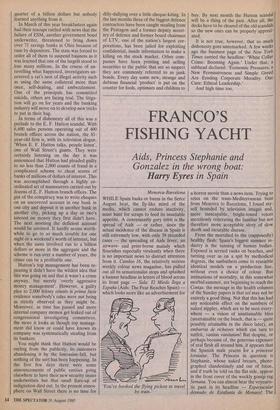FRANCO'S FISHING YACHT
Aids, Princess Stephanie and
Gonzalez-in the wrong boat: Harry Eyres in Spain
Menorca-Barcelona WHILE Spain basks or burns in the fierce August heat, the fly-like mind of the media, which cannot endure inactivity, must hunt for scraps to feed its insatiable appetite. A conveniently gory titbit is the spread of Aids — or rather, since the actual incidence of the disease in Spain is still extremely low, with only 39 recorded cases — the spreading of Aids fever, an airwave- and print-borne malady which flourishes especially virulently when there is no important news to distract attention from it. Cambio 16, the relatively serious weekly colour news magazine, has pulled out all its sensationalist stops and splashed a banner headline in letters of blood across its front page — Sida: El Miedo llega a Espana (Aids: The Fear Reaches Spain) which looks more like an advertisement for `You've booked the flying pickets to travel by train.' a horror movie than a news item. Trying to relax on the trans-Mediterranean boat from Menorca to Barcelona, I found my- self hounded by television images and, more inescapable, bright-toned voices mercilessly reiterating the familiar but not therefore more acceptable story of slow death and incurable disease.
From the mortified to the (supposedly) healthy flesh: Spain's biggest summer in- dustry is the tanning of human bodies. Exposed in serried ranks on beaches, and turning over as on a spit by methodical degrees, the sunbathers come to resemble identical models on a production line, without even a choice of colour. But intimations of mortality, in this somewhat morbid summer, are beginning to reach the Costas: the message in the health columns of the Sunday papers is that sol may not be entirely a good thing. Not that this has had any noticeable effect on the numbers of naked nipples, which are to be seen every- where — a vision of unattainable bliss (unattainable on the beach, that is — quite possibly attainable in the disco later), an embarras de richesses which can turn to surfeit, vanitas vanitatum! But despite, or perhaps because of, the generous exposure of real flesh all around him, it appears that the Spanish male yearns for a princesse lointaine. The Princess in question is Stephanie, whose naked breasts, photo- graphed clandestinely and out of focus, and if truth be told on the flat side, appear in the front cover of the weekly gossip rag Semana. You can almost hear the voyeuris- tic pant in its headline — Espectacular desnudo de Estafania de Monaco! The
admonitory image of Ronald Reagan's nose has, by contrast, been little in evi- dence.
Politicians in general, however, are the media's first, greatest and most constant passion. So deeply attached to their politi- cians are the Spanish papers that they pursue them even when they are not engaged in politics. August is the month to see politicians and even monarchs in shorts, in bathing trunks, windsurfing, sailing, fishing, or just, in the tradition of the mythical Sr Rodriguez, ligando — the suggestive Spanish word which covers all kinds of unofficial womanising.
The Spanish politician who appears to least aesthetic advantage in bathing trunks Is unquestionably the leader of the right- wing opposition party Alianza Popular, Manuel Fraga. It is possible, on second thoughts, that Fraga's impressively portly physique, clad in old-fashioned long (but not Bermuda) trunks, may have a potent appeal for those who value comfort and solidity above youth and chic. Approp- riately, Fraga is pictured bathing not on one of the fashionable Costas but on the Chillier shores of his native Galicia. In fact Fraga has let it be known that he will be staying in Galicia until, the Galician auto- nomous elections are held in November. He claims that he will thus have spent 15 times more days in Galicia than any other politician: no one will dispute that, but most see this quixotic move as a tacit admission by Fraga that he has no real
answer to a government that, as El Pais once pu't it, has moved from socialism to monetarism in the space of three years.
King Juan Carlos cuts a more impressive figure, not in bathing trunks but in the white shorts of a master yachtsman. One imagines that Prince Philip would think twice before giving himself a Duke of Edinburgh award, but the Spanish monarch had no qualms at all about winning the fourth Copa del Rey (King's Cup) aboard his yacht Bribon V, beating his son, another Prince Philip, into second place. More dashing than the King, who though respected is considered a rather ordinary person, are the still quite young Turks of Spain's first socialist government since the Thirties. The ex-`superminister' Miguel Boyer, architect of the govern- ment's not very socialist economic policy, who resigned recently in circumstances which remain obscure, is too grand a figure to be seen even in shorts. He has, however, allowed himself to be photographed (beautifully suited) in the company of Spain's leading femme fatale, Isabel Preys- ler. La Preysler was married for a time to Julio Iglesias, before progressing to old aristocracy in the shape of the Marques de Grifion. Now she has moved up to the modern aristocracy in which bankers, accountants and economists are kings.
The most powerful man in Spain, the youngest head of government in Europe and, according to admiring press reports
from all over the world, the most attractive and the most intelligent, is not Juan Carlos or Miguel Boyer but Felipe Gonzalez. Boyish-looking, called by his first name by the entire nation, and married to a beauti- ful wife, you would think that Felipe had it made as a media premier. So indeed he did — at first. His summer holiday fishing in Mallorca sounds innocent enough, but perhaps in retrospect the choice of fishing vessel was a little unwise. Felipe has now gone on two fishing trips in Franco's state yacht, the Azor. No matter that while the stern generalfsimo hunted for big game, tuna and swordfish a la Hemingway, the egalitarian premier fishes sea-bass with a simple rod and line; a hostage has been given to fortune, and crafty old men of the right like Emilio Romero, as well as disaffected left-wingers, are playing it for all it is worth. A case of hubris, writes Romero in El Dia de Baleares: another sign that the jumped-up men of the new democracy (Suarez and Gonzalez), un- accustomed to power, let it go to their heads; proof that these two never consi- dered themselves to be ordinary European heads of government, but rather presidents in the American style. Also, for Romero, it is downright deceitful for a socialist to use the accoutrements of an autocrat. To us with a longer tradition of democracy, however, it seems more like the way of the world; I doubt that such angling as Rom- ero's, however cunning, will catch more than the odd minnow.











































 Previous page
Previous page